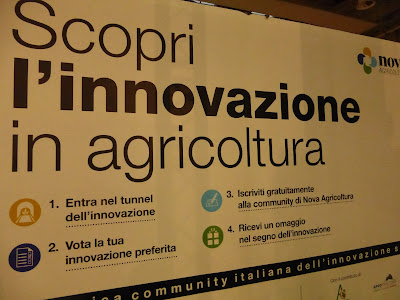“The watchword for agriculture’s future is innovation,” said Raffaele Maiorana, youth president of Confagricoltura, at Fieragricola, the 112th Agricultural Techonologies Show in Verona.
“The new course of agriculture comes inevitably from cutting-edge technologies, sustainable development, precision farming, but also the creative use of Big Data,” said Mr Maiorana.
Big Data seminar at Fieragricola
With the average Italian farm just 7ha, sharing and accumulating data between businesses has a great potential to help individual farmers. Combining data resources gives individual farmers a level of information that would be impossible to generate alone.
The power of collecting and sharing data for innovation that could save the future of Italian agriculture was a running theme at Fieragricola.
Held in Verona in the Veneto province, 3 – 6 February 2016, Fieragricola, attracting over 100,000 visitors, had a broad programme of seminars, presentations and machinery demonstrations spanning all of the Italian agricultural sectors.
For the province’s leaders, the 18,264 km² Veneto region is a fitting place to demonstrate the benefits of sharing farm data. It is home to over 665,000 agricultural companies, with growth in agricultural employment at 23%, according to Governor Luca Zaia.
Provincial President, Antonio Pastorello, said: “Agriculture is still one of the sectors driving the Veronese economy, the third Italian province in terms of exports and top in the Veneto for livestock numbers, with 57% of the regional total.”
In a seminar on the second day of the event, Mr Maiorana identified opportunities for the Italian agri-food sector to make the most of big data, acknowledging that production systems have to interact with very different information systems. The simplest case, he said, is using meteorological and environmental data compiled by external information stations to inform production cycles. For example, a system of sensors for the supply of water or the flow of rivers, could help farmers to manage their water resources.
“Agriculture is already fully involved in the digital revolution,” Mr Maiorana continued. “In the countryside it is vital that technologies integrated with the internet grow in a co-ordinated way, to ensure development and sustainable growth, attention to the land and its products. Intelligent agriculture will have to know how to use Big Data across the huge amount of available information, connecting them and interpreting them in an integrated system to help grow our industry.”
Wine growers in some regions across Italy are already contributing to and benefiting from these kinds of data networks.
Big Data in Barolo
In the Barolo area, a community of farmers upload their data to a secure website and share it with others in the group.
“Farmers get information on weather and disease modelling, which is needed for good management of the crop,” said Dr Andrea Lari of Pessl Instruments, which manages one of these data-sharing networks.
“Farmers can also save money through collaboration, because the average farm size is not big. Tools for sharing information could help us overcome some major challenges for Italian agriculture, ecological and economical, for example,” said Dr Lari.
Data volume in Valpollicella
Another example comes from the Consortium of Valpollicella Wines, where a project on using moth pheromone traps has grown to cover almost 2,000ha of farmland, from just 50ha in 2011. Certification is likely to be available in 2016 for those farmers in the project who correctly employ the integrated plant protection protocol, as well as for those who correctly practice the methods of using pheromones to protect against moths.
Another programme in Valpollicella, Riduci, Rispetta, Risparmia (‘Reduce, Respect, Save’), is an environmental initiative which started with ten pilot farms and now covers at least 2,000ha. Farmers involved in this scheme meet together on farms, have training meetings on farms, and receive newsletters, emails and texts – all to help farms improve their sustainability.


